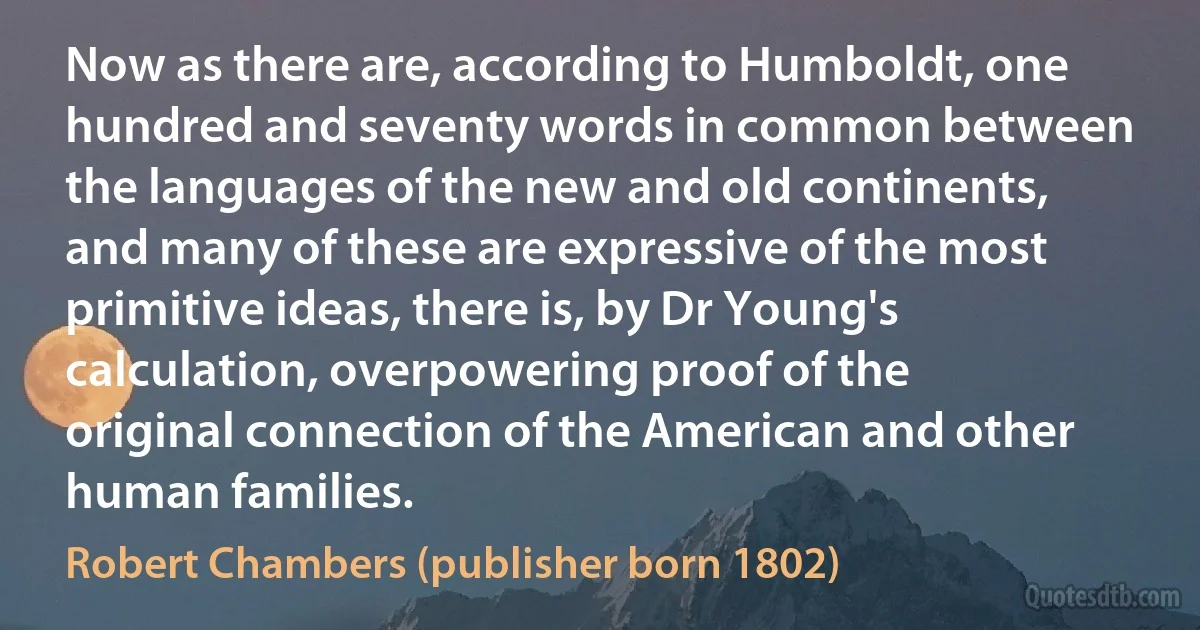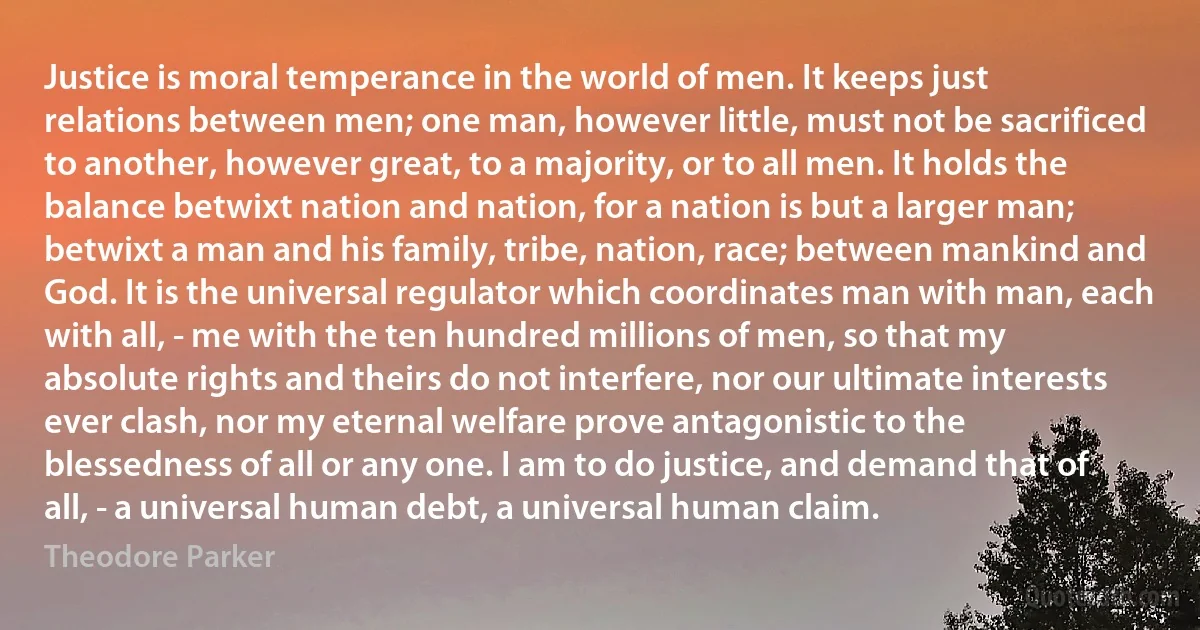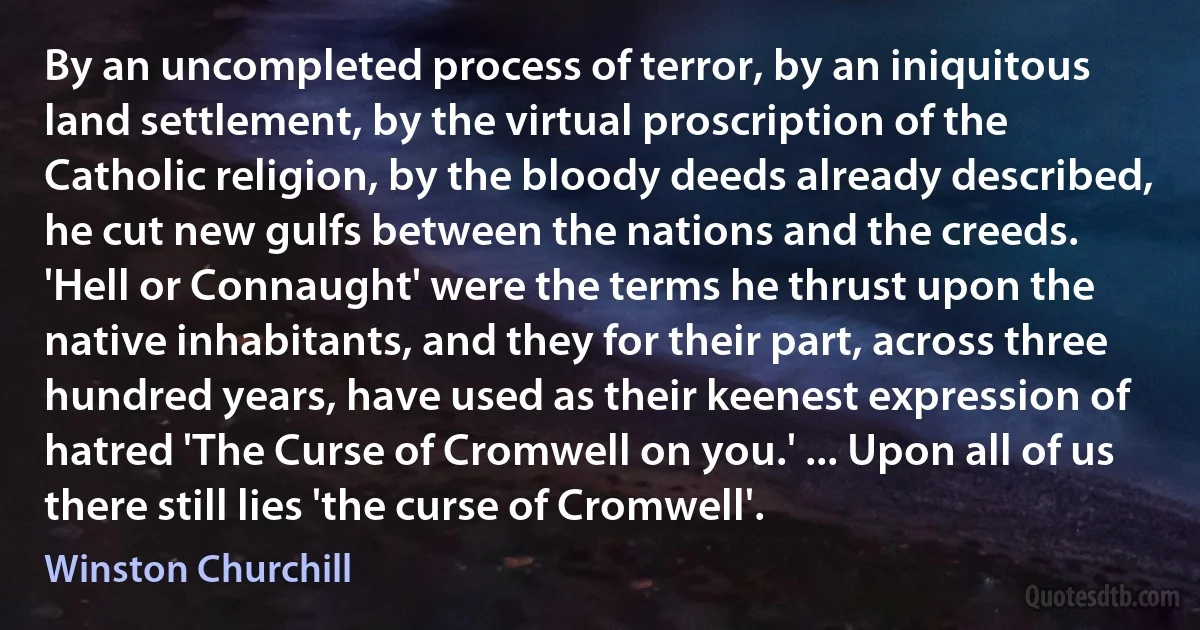Hundred Quotes - page 79
For four hundred years the human race has not made a step but what has left its plain vestige behind. We enter now upon great centuries. The sixteenth century will be known as the age of painters, the seventeenth will be termed the age of writers, the eighteenth the age of philosophers, the nineteenth the age of apostles and prophets. To satisfy the nineteenth century, it is necessary to be the painter of the sixteenth, the writer of the seventeenth, the philosopher of the eighteenth; and it is also necessary, like Louis Blane, to have the innate and holy love of humanity which constitutes an apostolate, and opens up a prophetic vista into the future. In the twentieth century war will be dead, the scaffold will be dead, animosity will be dead, royalty will be dead, and dogmas will be dead; but Man will live. For all there will be but one country-that country the whole earth; for all there will be but one hope-that hope the whole heaven.

Victor Hugo
[People] think of saints as people who lived an awfully long time ago and whose validity has disappeared. I think of them as people who didn't live such a long time ago, only a few hundred years or so. There must have been something about them that impressed people who were very much like me. What was it? And they must have been much more like somebody living today than we commonly think. What was behind it? What made these people special and what made a lot of other people regard them as special, either hating them or loving them? This is fascinating. It enlarges the whole world, and because it does so, it gives you great hope and sympathy with the future. You find yourself not an isolated miserable little wretch who has got seventy or eighty years to struggle along and then perish like nothing. You are the continuer of a very great tradition which you are going to pass on to the next lot. And you're right in the middle of the great stream of life. You see? Wonderful thing.

Robertson Davies
Any man who outgrows the myths of childhood is ninety-nine percent aware and convinced of his own mortality. But then comes the chilly breath on the nape of the neck, a stirring of the air by the wings of the bleak angel. When a man becomes one hundred percent certain of his inevitable death, he gets The Look.

John D. MacDonald
Just incredible! Look at Hope Solo celebrate! There is an American party going on, all around the terraces! Surely the whistle's going to go any second, and it will be a penalty shootout. Abby Wambach in the one hundred and twenty-second minute. Well that does match the drama of the men's World Cup last year, and the Landon Donovan goal which saved the USA against Algeria, doesn't it? Well, well, well! And the goal was scored in the time added on for the largely bogus injury, we think, to Érika. Is there some kind of poetic justice in that? It's not finished yet, though. Still the referee plays on, and here's Marta again! Solo beats it away; it will be a corner. How much more of this can there possibly be? It is over! It will be a penalty shoot-out! An incredible finish, one of the great climaxes to any World Cup match! Brazil are denied at the death! A ten-woman USA save it! Wow, we need to get our breath back. So let's go back to Bob Ley for a moment.

Ian Darke
People want the truth. Even if they can't handle it, they want it. They may want to look at it as a story or music so they can distance themselves from it, but they want it. That's why people watch the news every night. There's nothing good on the news. They'll throw in a little "good news" near the end, like something about a cat being saved from a tree. But before you hear about that cat, you're going to learn that someone got shot and killed, an earthquake killed a couple of hundred people, and that whatever war is going on at the time is still going on and going hard. And you still watch. Why? Because you want the truth. You'll complain, but you'll watch. Every night. The news always gets good ratings.

50 Cent
He was shot in the back of the back several times one hundred metres or so from the walls of the Kremlin, one of the most closely CCTV-filmed areas on earth. The official narrative was that a bin lorry obscured the Kremlin's cameras from capturing the killer or killers. Attentive readers will have already got it, but for the avoidance of any doubt the official narrative is a load of old hogwash. In my four decades-plus of reporting, I have never been detained by police officers more often than outside the Kremlin. You cannot move five yards without a cop demanding to see your passport. The idea that Nemtsov was assassinated but that none of the Kremlin's cameras captured critical evidence is absurd.

John Sweeney (journalist)
There's a knock at the door, and Valentino and Dr. Emeterio enter. This is it. Suspense really isn't good for someone with my condition, and every second of silence is brutal. "What's up?" I ask, wanting to get this over with, one way or the other. "It's nice that something good will come out of this," Valentino says, pressing his hand to his chest. My heart skips a beat, two, ten, a hundred, a thousand, a million, and somehow, I don't die on the spot. In fact, I'm going to live. I'm going to live, live, liv, live, live, live, live, live, live, live, live, live.
But first, he has to die.

Adam Silvera
He was the first right fielder that I remember that would literally take balls off the right field wall in Forbes Field – it was only three hundred feet down the line – and he'd take the ball off the wall and without even looking, just spin around and throw the ball in behind the runner coming around first base. He'd get the guy going back to first before he could even stop and turn around. Maybe only one time did a runner keep going to second off him, anticipating that he was going to throw behind him. He was just uncanny; those guys wouldn't even make a turn at first base when they'd hit a ball off the screen in right or off the wall.

Roberto Clemente
Well, as you know, I was blessed to do over a hundred events for my dear brother [Bernie Sanders]. And this is the first time I've had a chance to publicly endorse him again, but yes, indeed. I'll be in his corner that we're going to win this time. And it has to do with the Martin Luther King like criteria of assessing a candidate namely the issues of militarism, poverty, materialism, and racism, xenophobia in all of its forms that includes any kind of racism as you know against black people, brown people, yellow people, anybody, Arabs, Muslims, Jews, Palestinians, Kashmirians, Tibetans and so forth. So that there's no doubt that the my dear brother Bernie stands shoulders above any of the other candidates running in the Democratic primary when it comes to that Martin Luther King-like standards or criteria.

Cornel West
Ninety-nine men in a hundred are natural men, that is, beasts of prey; and it is mere insanity, in business matters, to deal with a stranger upon any other assumption than that he is a natural man, though we should veil our knowledge of the actual fact by a courteous recognition in words and manners of his better possibilities.

Coventry Patmore
A commercial company enslaved a nation comprising two hundred millions. Tell this to a man free from superstition and he will fail to grasp what these words mean. What does it mean that thirty thousand men, not athletes but rather weak and ordinary people, have subdued two hundred million vigorous, clever, capable, and freedom-loving people? Do not the figures make it clear that it is not the English who have enslaved the Indians, but the Indians who have enslaved themselves?

Leo Tolstoy
I was convinced that Lake Como was a large basin of water similar to the Tahoe, also surrounded by immense mountains whose slopes reach the shores, but here the lake is not a basin, since the banks are articulated like those of a stream and is a quarter or two thirds wide of the Mississippi. Along the coast there is not a single strip of flat land, but endless chains of mountains which suddenly emerge from the lake surface and rise towards the sky for one hundred or two hundred feet, constantly varying in shape. The rocky ridges are covered with numerous plant species and dotted with white villas that peek through lush foliage. Even on the top of the promontory we saw pretty little houses perched on picturesque pinnacles, more than a thousand feet above our heads.

Mark Twain
Two thousand years ago in Palestine, the Lord Maitreya's consciousness entered into that of His disciple, Jesus, at the Baptism. For three years, Jesus demonstrated the consciousness of the Christ ---- the Lord Maitreya ---- and became Jesus, the Christ, or Messiah. Five hundred years earlier, the Buddha worked through His disciple, the Prince Gautama, and Gautama became Gautama Buddha.

Benjamin Creme
Poetry is not; or seems not to be. But it appears that among the great conflicts of this culture, the conflict in our attitude toward poetry stands clearly lit. There are no guards built up to hide it. We call see its expression, and we can see its effects upon us. We can see our own conflict and our own resource if we look, now, at this art, which has been made of all the arts the one least acceptable.
Anyone dealing with poetry and the love of poetry must deal, then, with the hatred of poetry, and perhaps even Ignore with the indifference which is driven toward the center. It comes through as boredom, as name-calling, as the traditional attitude of the last hundred years which has chalked in the portrait of the poet as he is known to this society, which, as Herbert Read says, "does not challenge poetry in principle it merely treats it with ignorance, indifference and unconscious cruelty."
Poetry is foreign to us, we do not let it enter our daily lives.

Muriel Rukeyser
Tonight, we gather to affirm the greatness of our nation-not because of the height of our skyscrapers, or the power of our military, or the size of our economy. Our pride is based on a very simple premise, summed up in a declaration made over two hundred years ago: "We hold these truths to be self-evident, that all men are created equal, that they are endowed by their Creator with certain inalienable rights, that among these are life, liberty and the pursuit of happiness." That is the true genius of America-a faith in simple dreams, an insistence on small miracles.

Barack Obama
Even a professed "revisionist" such as Ebeling cannot free himself entirely from orthodox-leftist historical myths when he appears to liken and classify as on a par the "evils" of Stalin and Hitler and the socioeconomic character of Soviet Russia and Nazi Germany. From 1929 to 1939, in peace time, Stalin and the Bolsheviks killed about 20 million Soviet citizens, for no predictable reason. Hitler and the National Socialists ruined the businesses and careers of hundreds of thousands of German citizens, but the number of people killed by them before the outbreak of the war was only a few hundred, most of them fellow Nazis and all of them for a predictable reason.

Hans-Hermann Hoppe
The appropriation of the grassland by the lords was challenged, but the more fundamental transformation of grassland (or of roads) from commons to resource has happened, until recently, without being subjected to criticism. The appropriation of the environment by the few was clearly recognized as an intolerable abuse. By contrast, the even more degrading transformation of people into members of an industrial labour force and into consumers was taken, until recently, for granted. For almost a hundred years the majority of political parties has challenged the accumulation of environmental resources in private hands. However, the issue was argued in terms of the private utilization of these resources, not the distinction of commons. Thus anticapitalist politics so far have bolstered the legitimacy of transforming commons into resources.

Ivan Illich
Although Ashoka was victorious in this horrific and gruesome war, he felt remorse for all the suffering he had caused and hence turned to Buddhism. He wrote in his Edict Thirteen that:
The Kalingas were conquered by His Sacred Majesty the King when he had been consecrated for eight years. One hundred and fifty thousand persons were thence carried away captive, and one hundred thousand were there slain, and many times that number perished. Directly after the annexation of the Kalingas, began his Sacred Majesty's zealous protection of Dharma, his love of Dharma, and his giving instruction in that. Thus arose His Sacred Majesty's remorse for having conquered the Kalingas, because the conquest of a country previously unconquered involves the slaughter, death, and carrying away captive of the people. That is a matter of profound sorrow and regret to His Sacred Majesty.

Ashoka



